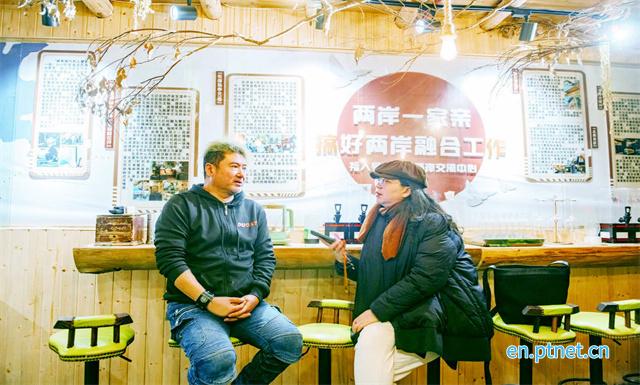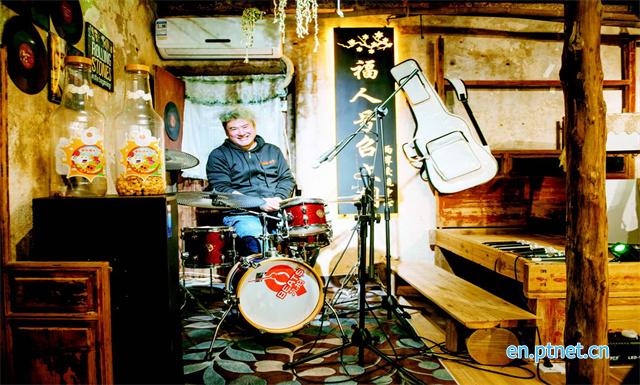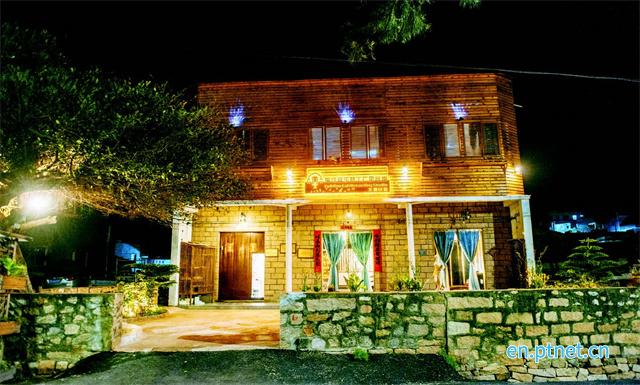Chen Bojing: Taiwan slashie’s journey to success
en.ptnet.cn | Updated:2023-03-20 | Lin Kongbo, StephanieChen Bojing, a former child star and winner of the Best New Artist at the Taiwan Golden Melody Awards, has made a name for himself in multiple fields, including directing, screenwriting, programming, and teaching. He is considered a slashie who has chosen to embrace a diverse range of professions and identities.
In 2018, Chen ventured to the Chinese mainland for better entrepreneurial opportunities, transforming a stone house in Xiaobei Village, Pingtan which is the closest place on the Chinese mainland to the island of Taiwan, into a cultural and creative hub, which later became a popular tourist attraction. He continued to replicate his rural development know-how in other villages’ revitalization projects.
"I consider myself a professional musician. Rural revitalization and development is just a sideline. But now I feel that it has way surpassed the main profession,” Chen said with a smile. He believes that the Chinese mainland is the place where his dreams took off, and he sees enormous market potential. Despite being called a "slash" uncle, Chen views it as just the starting point of his career.
Chen plans to integrate his experience in community development and cultural creation in Taiwan with the unique characteristics of Pingtan to develop various themes, such as ecological, industrial, handicraft art, and intangible cultural heritage cultural creations. He believes that Taiwan's experience in developing creative communities can serve as a reference for the Chinese mainland in recreating cultural communities. He hopes to actively explore and promote exchanges, and integration between communities across the Taiwan Straits.
Taiwan-flavored Milk Tea Shop 600 meters above sea level

Chen Bojing (left) shares rural development concepts from Taiwan in Guanglou Village, Pingtan.
On a Saturday morning in early March, reporters from Pingtan CMC boarded a high-speed train from Pingtan to Fu’an in the eastern part of Fujian Province, embarking on a journey to interview Chen Bojing. Following the navigation, it took nearly an hour and a half to reach Nanyan Village nestled in the mountains. The morning sun at eight or nine o'clock brought early spring warmth, casting a golden glow over the ancient village. Against the backdrop of verdant mountains, the quaint yellow walls and grey tiles shone brilliantly like a painting with vivid colors, while a blush of rosy clouds peaked out from the hilltop, and the sweet bird songs filled the air.
Nanyan Village is a beautiful and traditional village tucked in the remote mountains of northern Fu’an, with a history of over 700 years and an elevation of nearly 600 meters. Due to its inconvenient transportation, it was once a deserted village. In 2020, thanks to the Fujian-Taiwan Rural Development Project, Chen Bojing led his cultural and creative team to settle in the village, carrying out a number of projects such as a cultural and creative milk tea shop, a Taiwan-themed grocery store, a light meal space, gallery, loft & culvert bars, a motorcycle club, and a rest station for backpackers, making it a popular destination for visitors from miles around.
As one steps into the village, lanes paved with cobblestones greet the eyes. Under the wooden pavilions, villagers relax and enjoy the cool breeze. Randomly strolling down an alley, one can find milk tea and coffee shops, farmhouses, and homestays, all packed with chatty happy tourists. The village permeates a rich cultural and creative atmosphere, with a surge of youthful vigor brought about by its rural development projects.
Nanyan Village's success story of blending locality with artistry began with a milk tea joint, Chen Bojing's first project in the village.
No. 10 in Nanyan Village was an old dilapidated building. Chen's team managed to overhaul it and it became a popular spot for tourists. The shop sells milk tea, longan and red date tea, latte, and coffee. "During the May Day holiday in 2020, we sold nearly 2,000 cups of artisanal milk tea in just three days," Chen Bojing recalled.
Following Chen Bojing outside the shop, we could still see broken pottery and other items left over from the construction process on the yellow earth walls. "If we had demolished and rebuilt these yellow earth walls, they would have lost their character," Chen said, emphasizing that all renovations were carried out in accordance with the principle of "repairing old things as they were" to maintain the original architectural features of Nanyan Village.
Many were amazed to find such a unique shop tucked in a remote traditional village.
Chen believes any cultural creative comes hand in hand with artistic and commercial value. Rural development should be a long-term endeavor that can't be rushed or overly conservative. While adhering to the principle of "repairing old and retaining most," it is essential to combine protection, development, and utilization.
"To meet the needs of modern urbanites who yearn for the countryside and nature, we need to create an atmosphere that blends rural and modern life," said Chen. "The countryside should retain its traditional agricultural civilization and atmosphere while incorporating modern elements."
"In 2018, I chose No. 1 Stone House in Xiaobei Village, Pingtan, as the studio for Furenhaozao, the team's cultural and creative brand dedicated to cross-Straits culture and bringing together like-minded individuals who are considered blessed. After two years of renovation, it gradually became a popular tourist attraction," said Chen. Unlike Pingtan, Nanyan Village has no sea, only mountains, and is an hour's drive from downtown Ningde city. Many people have asked why I chose such a remote village. I like challenges, just like when I renovated the stone house in Xiaobei, I carried the stones by myself.
Wearing out 7 pairs of shoes on Dongxiang Islet

Chen Bojing pictured playing drums in a stone house of Pingtan
In 2018, Chen developed a strong interest in cultural and creative work and set up a cultural and creative base in Fujian, on the west coast of the Taiwan Straits. "I didn't know that I could take a direct high-speed ferry to Pingtan. I went to Xiamen via Kinmen," said Chen. His friend in Xiamen told him that there was a place in Fujian called Pingtan, where the cultural and creative policies were favorable and suggested he go and take a look himself. "Simple and natural, that was my first impression of Pingtan." Over the course of a week, Chen rode a bicycle, took a bus, and walked around Pingtan, and later he met Wang Feng, a young entrepreneur on Dongxiang Islet.
As a native of Dongxiang Islet, Wang, who was then the secretary-general of the Pingtan Tourism Association, converted his ancestral house into a homestay, and other villagers followed suit. Wang met Chen on Pingtan Island and, because of his natural affinity for Taiwan entrepreneurs, brought him to Dongxiang. Although an outlying islet, Dongxiang is a popular tourist destination, thanks to hit variety shows like "Dad, Where Are We Going?" However, due to the poor infrastructure, there are plenty of underlying obstacles to cultural and creative work on the islet. Wang soon found that his worries were unnecessary. "When Chen arrived at Dongxiang's Xiaobei Village, he pointed to a house on the edge of a mountain cliff and said, 'This is it. How can I rent it?'" Wang said. It was less than ten minutes after Wang landed on the islet.
"I want a house facing the sea, where spring blossoms," this is a line from the poem by Hai Zi, a modern Chinese poet and it is also the life Chen longs for. Chen regards the No. 1 Stone House in Xiaobei as his ideal residence.
During the two years of “building dreams,” a scene like this would always take place in Xiaobei: under the scorching sun, a middle-aged man carrying a backpack of sand and stones, different lengths of wood up and down, even a water-pumping toilet that weighed over 100 pounds step by step. In the hot summer, with sweat pouring down his back, Chen would stand in the sea breeze blowing from the Taiwan Straits, squint his eyes, let the cool breeze caress his face, listen to the birds chirping, take a short break, and then throw himself back into the construction. He would often carry heavy objects for several hours in a row. Every day, he would wake up to the sound of waves, and end his day's work under the enchanting sunset. In the tranquil village at night, his low-voice singing and humming could be heard... These days were simple yet fulfilling.
"I was like 'Robinson Crusoe', who drifted to a deserted island and sought survival here. I constructed the bathroom, made a bed, built a kitchen, and planted flowers by myself,” Chen said. "I wore out 7 pairs of sneakers, isn't that fun?"
"Having finished work every day, I watered the plants, read books, played the piano, and sang songs. I felt like an ancient scholar passing down knowledge to future generations. The hard work is worth it, and the sweat gives this house life and stories. My personal icon arose." In Chen Bojing's plan, this base that combines cultural and creative work, music, and literary creation will tell his story and that of Dongxiang Islet.
"The man from Taiwan is really something. He transformed an old stone house into a new one and even grew sunflowers..." The villagers raised their thumbs in admiration. Having heard Chen's story, tourists flocked in, took pictures with his sunflower, and chatted till late.
Chen, who came from the big city of Taipei, has had a colorful life but wants to spend the rest of his life living in the countryside. Maybe the true value of country life needs to be re-assessed and valued. Are we missing out on the true value of rural living?
Chen has his answer: Anything can become a cultural creative. Both Taiwan and Pingtan are an island. So Taiwan's cultural creatives could be replicated in Pingtan, and the key lies in human effort. "The significance of cultural and creative work can encompass all, from the past to the present, be it traditional or technological. The creative use of cultural relics can activate and integrate any trajectory of human civilization, which stimulates wild imagination, allowing new things to have traditions and old things to have a new value. This is the greatest significance of cultural and creative work," said Chen.
Dreams take off again
Starting from the No.1 Stone House in Xiaobei Village, Chen became more determined. He began to embark on the journey of building beautiful rural areas on the mainland.
Now, Chen has new identities, including a community builder, an art director, and a supervisor of the Pingtan Straits Pop Music Association. His heart is even closer to the city of Pingtan.
In 2019, Chen "copied" the “Furenhaozhao” from Xiaobei Village to downtown Pingtan, combining the cultural and creative shops with tourism to create a one-stop service platform for dining, drinking, and recreation.
In 2020, when he learned that Pingtan was recruiting young people from Taiwan to get involved in rural construction and promote grassroots integration between the two sides of the Taiwan Straits, he volunteered to participate in the village construction in Guanglou Village and Guangyu Village. After over a month of in-depth research, Chen decided to use his own resources and do what he is best at - cultural and creative work.
"Guanglou Village is only 1 kilometer away from the Aoqian Passenger Terminal in a straight line, and it takes only 5 minutes to ride a bike to get there, so I created a one-stop service space for lodge and accommodation to gather people,” Chen said.
Therefore, he rented 7 idle residential buildings in Guanglou Village and transformed them into different functional areas, such as the Straits Music Dream Factory Recording Studio-themed Homestay, the Cross-Straits Exchange Center, and the Taiwan Food Culture Museum of the Duck-raising Family. It has become another upgraded version of the No.1 Stone House.

At night, the lights are on at the Cross-Straits Music Dream Factory Recording Studio.
At present, the Strait Music Dream Factory Recording Studio-themed Homestay has been put into use. Outside the yard, European-style fountain sculptures flow with water, and green plants fill the space. The first floor houses a professional music recording studio, which meets the needs of island musicians. The second-floor public space is furnished with leather sofas and coffee machines. In the homestay rooms, indoor landscape gardens, intelligent toilets, and saunas are equipped, adding a touch of refinement and luxury to meet the high-standard accommodation needs of tourists.
In the Cross-Straits Exchange Center, old-fashioned wooden beds collected from villagers' homes have been transformed into booths and performance stages. Retro posters and vinyl records cover the walls, and visitors can listen to music, cook, and enjoy a quiet time here.
"It is a pity to abandon old houses. Cultural and creative work and music can bring them back to life," Chen said. He hopes that the center can serve as a platform for cultural exchanges between the two sides of the Taiwan Straits, guiding young people to learn and exchange at the base and promoting cultural and artistic exchanges and integration across the Taiwan Straits.
Recently, to create the Fujian-Taiwan Rural Development Project, Chen has been traveling in Ningde, Pingtan, and other places, revitalizing more rural resources before the peak tourist season and welcoming tourists from all over the world.
Xiao Wu, a post-90s generation and a native of Pingtan, joined the "Furenhaozhao" cultural and creative team a year ago. Previously working in interior design, he now follows Chen and has learned how to brew coffee, appreciate music, and operate drones for photography, becoming a core member of the team. He said that he sees the vitality and energy of a young man in the 50-something-year-old Chen. It seems he gets a shot of adrenaline every day. "Don't think too much, just do it. That's what he always tells us."
"In the future, I want to turn the base into a pilgrimage site for cross-Straits cultural, artistic, and technological exchanges, and turn Dongxiang Islet into a music exchange destination for both sides of the Taiwan Straits and beyond, promoting cultural and artistic exchanges and integration across the Straits." This is the dream that Chen Bojing once mentioned in an interview. Now, the dream has taken off from Pingtan to the east of Fujian, reaching more places in Fujian, awaiting the blossoming and bearing of fruit.
Spotted a mistake or want to add something? All rights reserved. Do not reproduce our content without permission–you can contact us directly on our Twitter mailbox. Follow @pingtanchina (Twitter)

 Fujian Public Security Registration Code: 35012802000271
Fujian Public Security Registration Code: 35012802000271